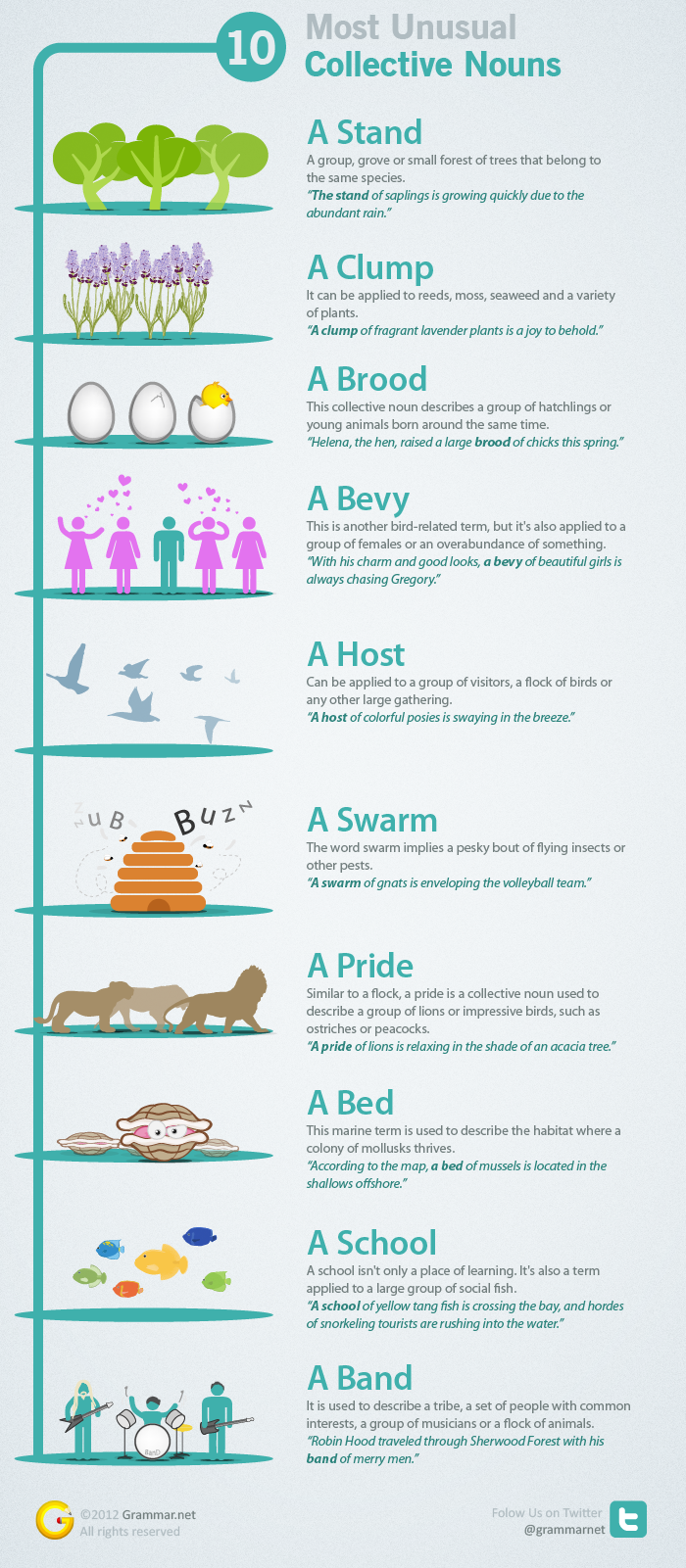In today's post, I'd like to look at collective nouns and the unusual names they have in English. A collective noun is a noun that describes a group, for example, "family", "board", "team". They can be tricky as they can be treated as singular or plural nouns. There is no strict rule here (sorry!). It all depends on whether the noun is treated as a group or single individuals and whether it's American or British English. For a further and excellent explanation, take a look at this post from Grammar Girl.

Picture: Perkins and Morley
There are over 200 collective nouns in the English Language (according to Grammar Girl). Some collective nouns have some very unusual names, particularly related to animals. Names like a murder of crows, a shoal of fish, a pod of dolphins, a pack of wolves/dogs, hyenas, a colony of ants/bats, a sleuth of bears and so it goes on.
I have to say that I keep discovering new names for different animals which sound utterly bizarre, so if you think you're the only one who hasn't heard of such strange nouns, you're not alone. Welcome to the crazy world of the English Language!
In this infographic, Grammar.net share 10 of these unusual collective nouns.

[Infographic provided by Grammar.net]
Here are the explanations of these nouns provided by Grammar.net and some additions by me (in purple).
1.) A Stand
This versatile collective noun is used in botany, forestry and agriculture. It denotes a group, grove or small forest of trees that belong to the same species.
A forester might say, “The stand of saplings is growing quickly due to the abundant rain.”
2.) A Clump
This is often applied to plants and refers to a cluster of tightly grouped stalks, plants or trees. It can be applied to reeds, moss, seaweed and a variety of plants.
Here’s an example: “A clump of fragrant lavender plants is a joy to behold.”
We can also use it for hair: "She grabbed a clump of hair from her opponent's head during the fight".
3.) A Brood
Used in zoology and farming, this collective noun describes a group of hatchlings or young animals born around the same time.
For example, “Helena, the hen, raised a large brood of chicks this spring. Farmer John is expecting a second brood this summer.”
We use it to refer to children in a family: "She is extremely busy with her brood of six children."
4.) A Bevy
This is another bird-related term, but it’s also applied to a group of females or an overabundance of something.
An observer might say, “With his charm and good looks, a bevy of beautiful girls is always chasing Gregory.” (often used in a humorous way)
5.) A Host
Famously used in William Wordsworth’s poem about daffodils, this versatile collective noun can be applied to a group of visitors, a flock of birds or any other large gathering.
Here’s an example: “A host of colourful posies is swaying in the breeze.”
It can also be used for things: "This hotel offers a host of leisure activities".
6.) A Swarm
The word swarm implies a pesky bout of flying insects or other pests. It’s also a verb that denotes a cloud of flying bugs. When referring to insects, one might say, “A swarm of gnats is enveloping the volleyball team.”
You can have a swarm of bees, ants and locusts
7.) A Pride
Similar to a flock, a pride is a collective noun used to describe a group of lions or impressive birds, such as ostriches or peacocks.
Here’s an example: “A pride of lions is relaxing in the shade of an acacia tree.”
8.) A Bed
This marine term is used to describe the habitat where a colony of molluscs thrives. It is often applied to clams, mussels, oysters and similar bivalves.
For example, a marine fisherman might say, “According to the map, a bed of mussels is located in the shallows offshore.”
We also refer to "a bed of roses"
9.) A School
A school isn’t only a place of learning. It’s also a term applied to a large group of social fish.
Here’s an example: “A school of yellow tang fish is crossing the bay, and hordes of snorkeling tourists are rushing into the water.”
We can also say "a shoal of fish".
10.) A Band
This collective noun is exceptionally versatile. It is used to describe a tribe, a set of people with common interests, a group of musicians or a flock of animals.
For example, “Robin Hood traveled through Sherwood Forest with his band of merry men.” (band of brothers).
Can you think of other collective nouns with unusual names that you've discovered whilst studying English? Please share them with me and your fellow readers here.
If you liked this post, please share it. And don't forget to subscribe to my blog if you don't want to miss out on my posts.
Ciao for now
Shanthi


No comments:
Post a Comment